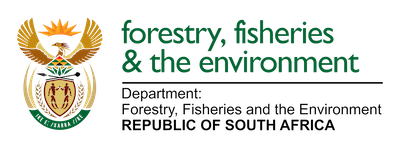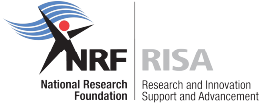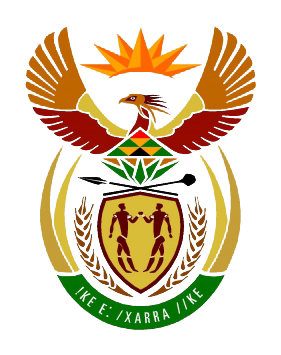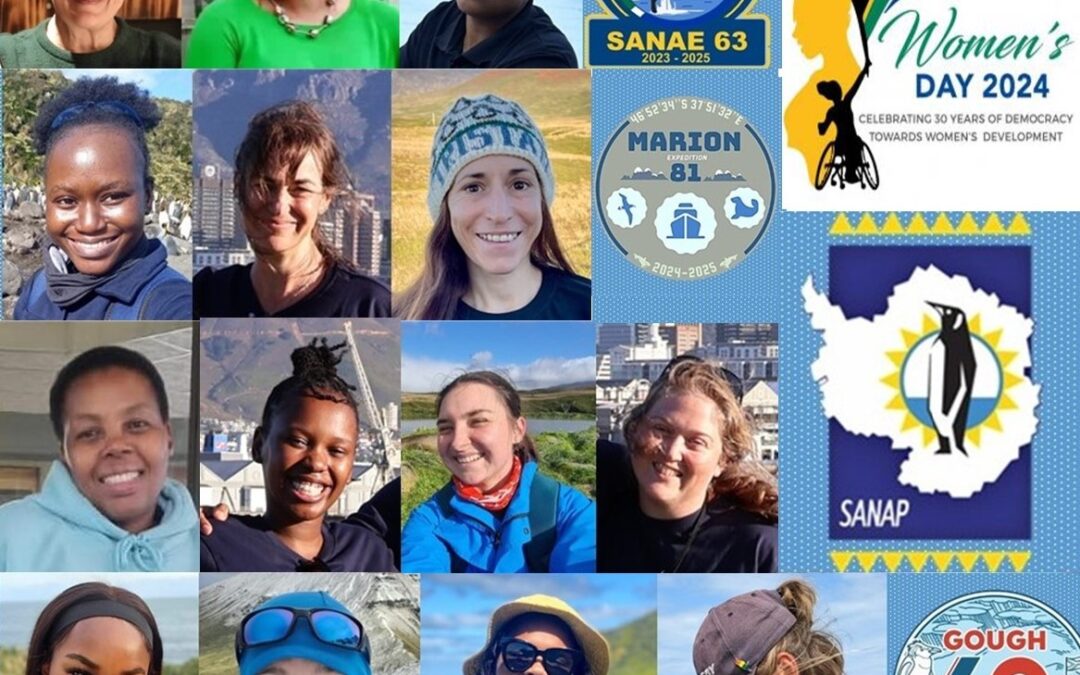
by Ria Olivier | Aug 9, 2024 | Antarctica, APECSSA, Commemorative Days, Gough Island, Legacy, Marion Island, Overwintering Team, Research, SANAE IV, SANAP
Theme of the National Women’s Day Commemoration:
“Celebrating 30 Years of Freedom Towards Women’s Development”
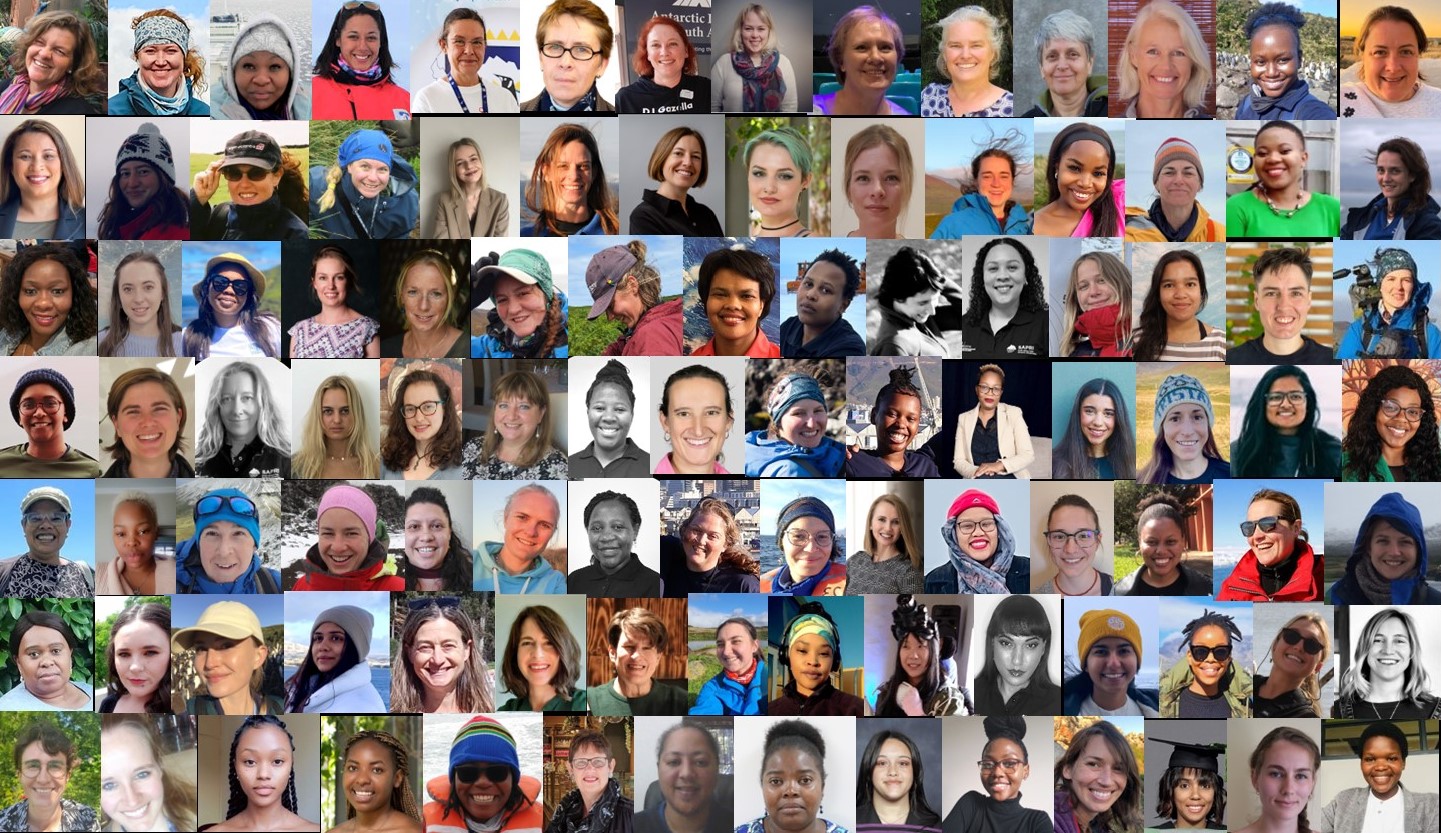 In the SANAP community we are celebrating all those involved as Researchers, Scientists, and Students at tertiary and research institutions and infrastructures, and personnel within the National Research Foundation, the Department of Forestry, Fisheries and the Environment, the Department of Public works and Infrastructure, the South African Weather Services, the South African National Space Agency, the South African Polar Research Infrastructure and all the women serving as part of the crew of the S.A. Agulhas II.
In the SANAP community we are celebrating all those involved as Researchers, Scientists, and Students at tertiary and research institutions and infrastructures, and personnel within the National Research Foundation, the Department of Forestry, Fisheries and the Environment, the Department of Public works and Infrastructure, the South African Weather Services, the South African National Space Agency, the South African Polar Research Infrastructure and all the women serving as part of the crew of the S.A. Agulhas II.
 Celebrating our women overwintering team members at our stations: Antarctica (SANAEIV), Marion Island and Gough Island.
Celebrating our women overwintering team members at our stations: Antarctica (SANAEIV), Marion Island and Gough Island.
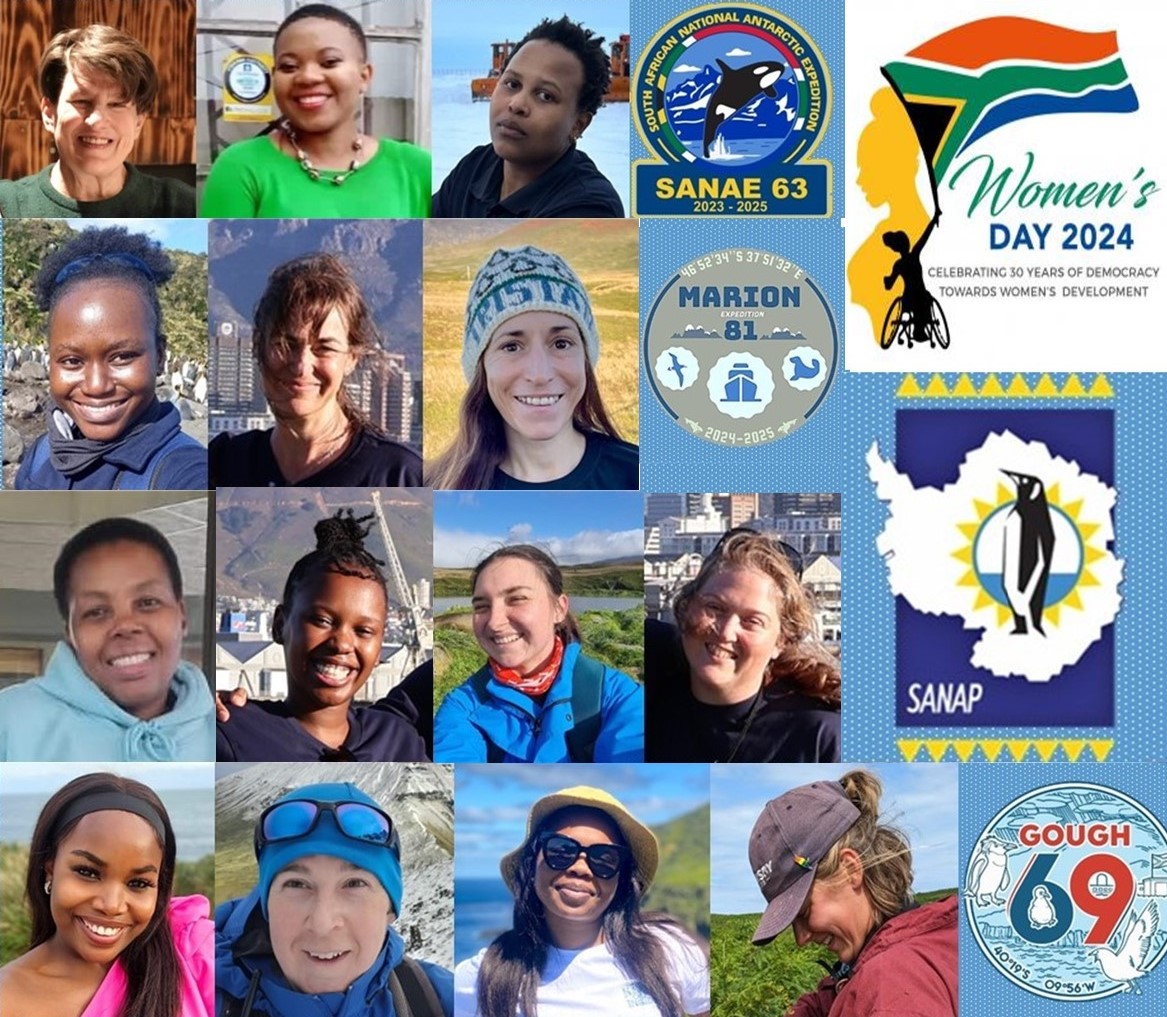 2024 women’s day commemoration is a reminder of the important contributions that are made by women to society, as well as a time to reflect on the advances in women’s rights. During 30 years of democracy, South Africa has made significant strides in advancing gender equality in all domains of society, including economic empowerment of women.
2024 women’s day commemoration is a reminder of the important contributions that are made by women to society, as well as a time to reflect on the advances in women’s rights. During 30 years of democracy, South Africa has made significant strides in advancing gender equality in all domains of society, including economic empowerment of women.
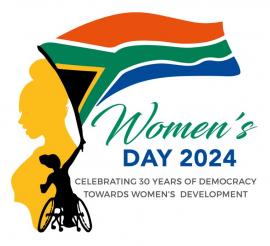 Women’s Day 2024 is the first national day led by the Government of National Unity (GNU) and takes place in a rural community as part of including all South Africans in national events, and placing a focus on the achievements and needs of women in all corners of the country. President Cyril Ramaphosa is expected to officiate the national Women’s Day commemoration in Pofadder in the Namakwa District, Northern Cape. – SAnews.gov.za
Women’s Day 2024 is the first national day led by the Government of National Unity (GNU) and takes place in a rural community as part of including all South Africans in national events, and placing a focus on the achievements and needs of women in all corners of the country. President Cyril Ramaphosa is expected to officiate the national Women’s Day commemoration in Pofadder in the Namakwa District, Northern Cape. – SAnews.gov.za

by Ria Olivier | Jun 16, 2024 | Commemorative Days, Important Dates, SA Agulhas II
Celebrating Youth Day today – Highlighting the school learners that attended the S.A. Agulhas II Open Day in Gqeberha, Eastern Cape.
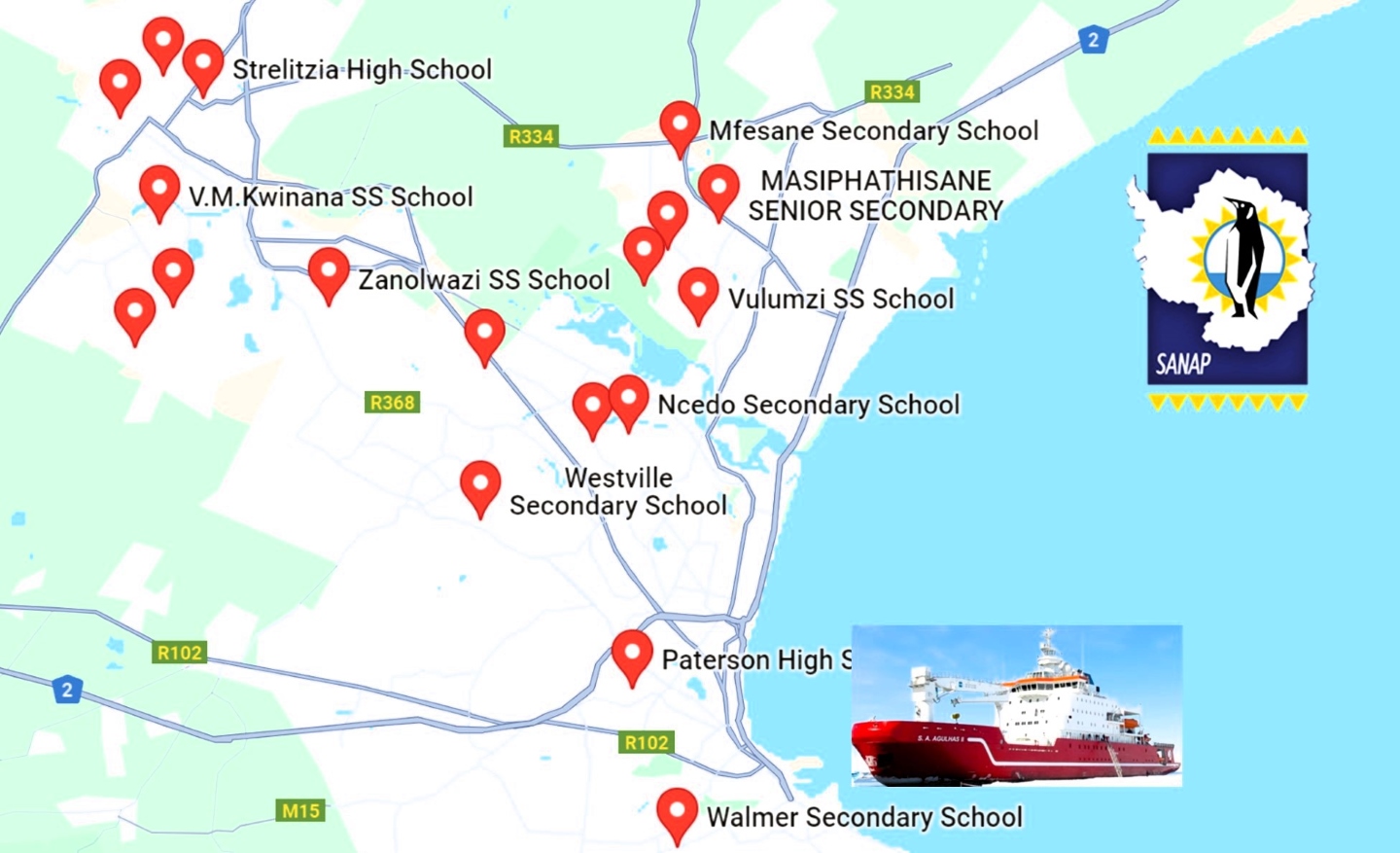 The Open Day was hosted by the Department of Forestry, Fisheries and the Environment of the S.A. Agulhas II at the Port of Port Elizabeth on 16 May and on the 17 May 2024, 1000 learners from 40 schools around the Metro were hosted.
The Open Day was hosted by the Department of Forestry, Fisheries and the Environment of the S.A. Agulhas II at the Port of Port Elizabeth on 16 May and on the 17 May 2024, 1000 learners from 40 schools around the Metro were hosted.
 In addition to exploring the SA Agulhas II, visitors on both days were able to engage with a diverse range of exhibits and interactive displays at an expo organised by DEFF and its partners. The expo showcased the vital work being done in marine research, conservation, and environmental stewardship.
In addition to exploring the SA Agulhas II, visitors on both days were able to engage with a diverse range of exhibits and interactive displays at an expo organised by DEFF and its partners. The expo showcased the vital work being done in marine research, conservation, and environmental stewardship.
 “We are thrilled with the overwhelming response by the residents of Gqeberha to the SA Agulhas II Open Day in Gqeberha,” said Minister Barbara Creecy. “This event provided a fantastic platform for the public to learn about the important research conducted aboard the SA Agulhas II and the critical role it plays as a supply vessel to the three research bases in Antarctica, Marion and Gough Islands in the Southern Ocean.” Full media release click here
“We are thrilled with the overwhelming response by the residents of Gqeberha to the SA Agulhas II Open Day in Gqeberha,” said Minister Barbara Creecy. “This event provided a fantastic platform for the public to learn about the important research conducted aboard the SA Agulhas II and the critical role it plays as a supply vessel to the three research bases in Antarctica, Marion and Gough Islands in the Southern Ocean.” Full media release click here
School Images: Department of Forestry, Fisheries and the Environment

by Ria Olivier | May 31, 2024 | Commemorative Days, Environment, SANAP
National Environment Month is celebrated in June, with the South African government and captains of industry leading the way by stimulating awareness on environmental issues and challenging all to become agents for change. June is Environment Month under the theme “Think, Eat, Save and reduce your foodprint”. we celebrate our Antarctic region environment.
 The theme for World Environment Day and National Environment Month rests on three pillars. According to the United Nations Food and Agriculture Organisation (FAO), every year 1.3 billion tons of food is wasted. Therefore, communities are encouraged to “Think” before discarding food off as waste. The second pillar, “Eat” encourages consuming food in such a way that the environmental impact is reduced. Third pillar encourages communities to make wise decisions about discarding food and “Save” as far as possible.
The theme for World Environment Day and National Environment Month rests on three pillars. According to the United Nations Food and Agriculture Organisation (FAO), every year 1.3 billion tons of food is wasted. Therefore, communities are encouraged to “Think” before discarding food off as waste. The second pillar, “Eat” encourages consuming food in such a way that the environmental impact is reduced. Third pillar encourages communities to make wise decisions about discarding food and “Save” as far as possible.
World Environment Day 2024 focuses on land restoration, halting desertification and building drought resilience under the slogan “Our land. Our future. We are #GenerationRestoration.” We cannot turn back time, but we can grow forests, revive water sources, and bring back soils. We are the generation that can make peace with land.
Environmental events celebrated during National Environment Month include:
- 5-Jun World Environment Day
- 8-Jun World Oceans Day
- 19-Jun World Albatross day
- 21-Jun International Day of the Celebration of the Solstice
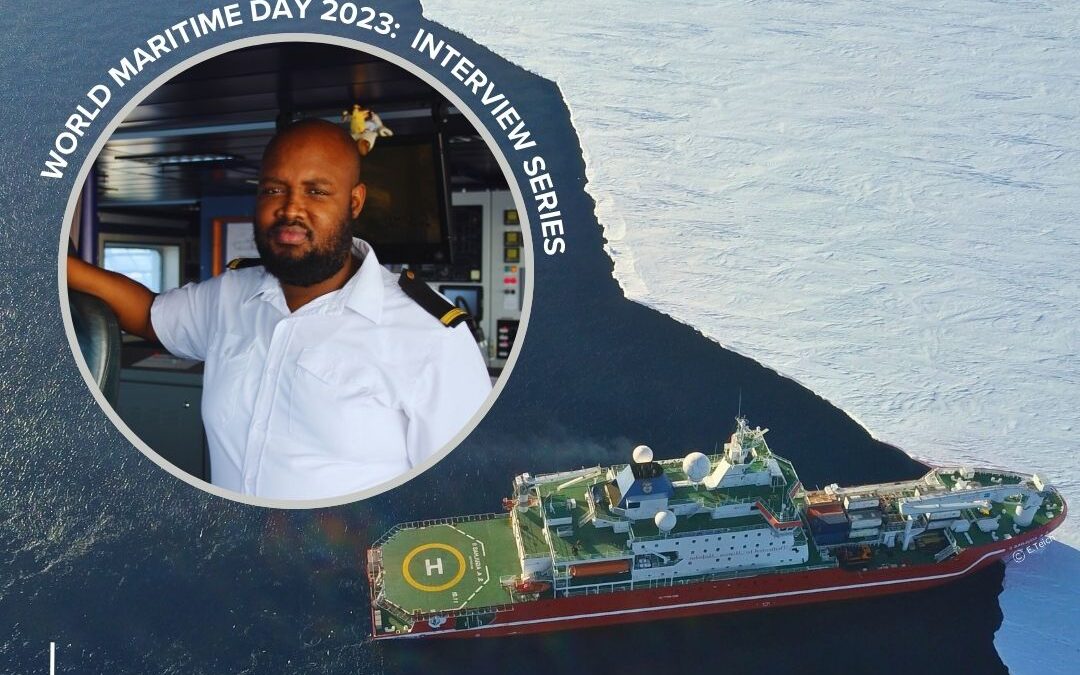
by Rabia Mathakutha | Sep 28, 2023 | Commemorative Days, Current Event, Important Dates, International Days, SA Agulhas II, SA Polar Infratsructure, SA Polar Research Infrastructure, SANAP, SAPolarRI, SAPRI, Science, Southern Ocean, Uncategorised
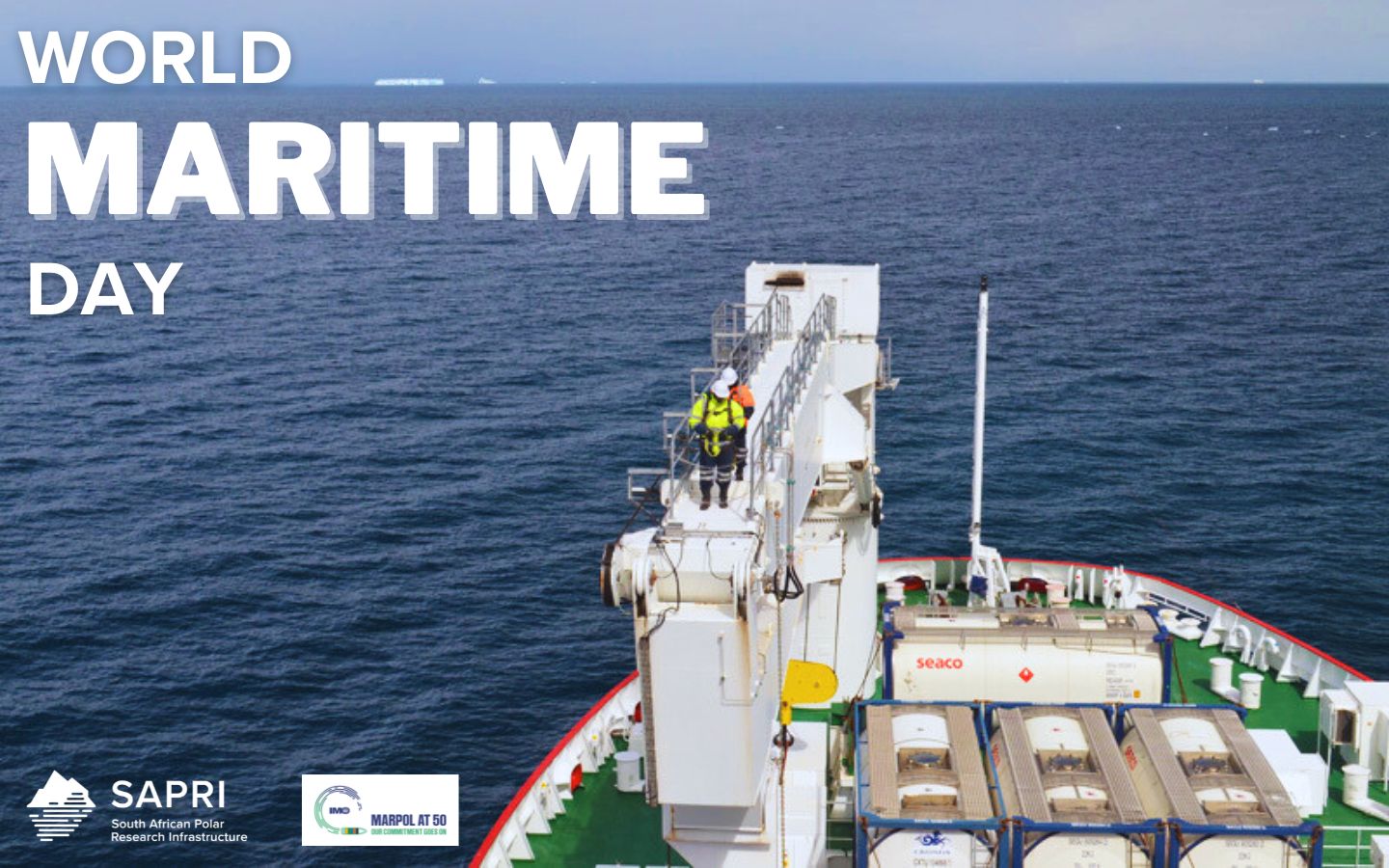
Today marks World Maritime Day, a global commemorative day celebrated every last Thursday of September. This annual observance serves as a tribute to the indispensable maritime industry and its pivotal role in connecting nations, enabling trade, and fostering economic growth. It is also an opportunity to reflect on the challenges facing the maritime sector and advocate for sustainable practices in an ever-changing world.
The International Maritime Organisation (IMO) has announced that this year’s World Maritime Day theme is “MARPOL at 50 – Our commitment goes on”. This theme highlights the 50th anniversary of the adoption of the International Convention for the Prevention of Pollution from Ships (MARPOL) on 2 November 1973. MARPOL focuses on preventing pollution of the marine environment caused by ships, whether it be from operational activities or accidental incidents.
International Cooperation and Sustainable Shipping
IMO currently has 175 Member States and three Associate Members. South Africa has been a member state of the IMO since 1995, sharing the responsibility to prevent pollution from ships.
In alignment with this year’s theme for World Maritime Day, we are reminded of the proactive measures taken by the country’s Department of Transport. In September 2022, they proposed amendments to the Marine Pollution (Prevention of Pollution from Ships) Act. One notable proposal is the potential increase in fines for ship pollution from R500,000 to R10 million, aiming to make non-compliance financially burdensome. These amendments specifically address the proper treatment and safe disposal of sewage from ships, as well as efforts to reduce greenhouse gas emissions that contribute to climate change and air pollution.
The South African research and supply vessel, the S.A. Agulhas II, is an example of a large ship that meets and complies with the regulations set forth in MARPOL. With its ice-breaking capability, the S.A. Agulhas II frequently navigates the Southern Ocean and Antarctic waters for scientific and research purposes as part of the South African National Antarctic Programme (SANAP).
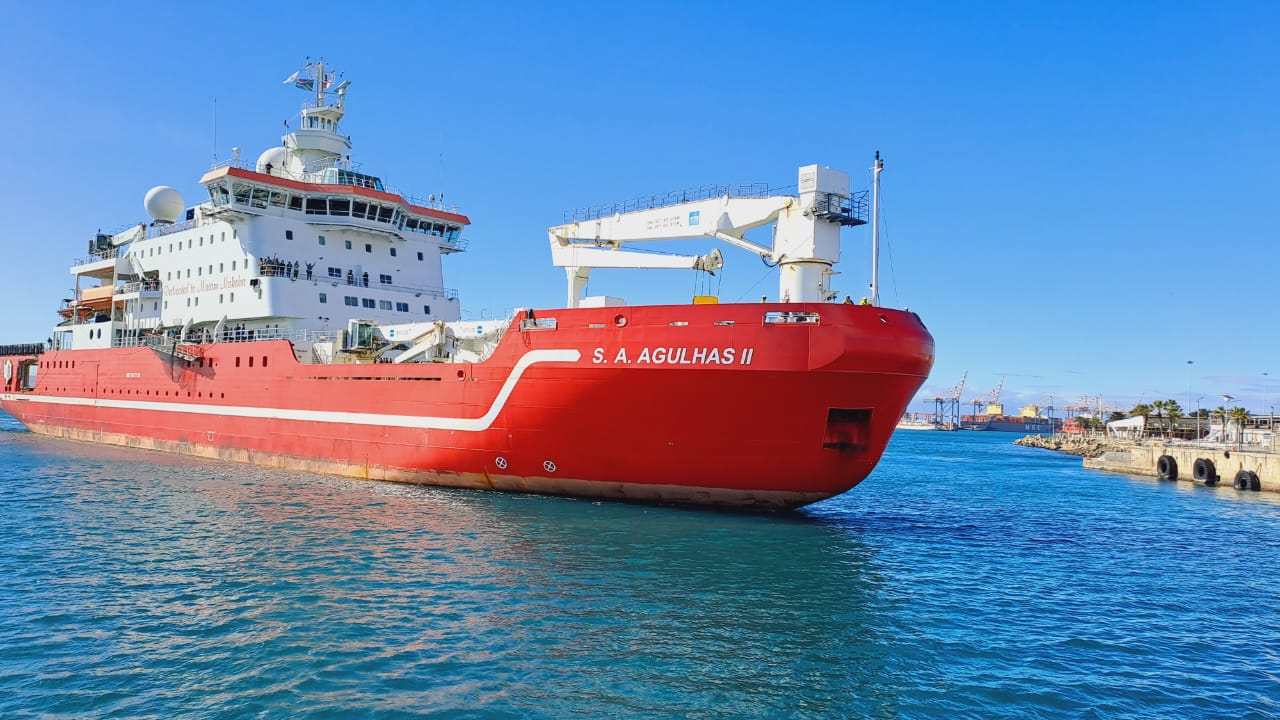
S.A. Agulhas II entering the Port of Cape Town, on return from the sub-Antarctic Marion Island. Image credit: Abuyiselwe Nguna (SAPRI LTO:Land Research Coordinator).
The S. A. Agulhas II is a state-of-the-art vessel that has been constructed with effective waste management systems. It is equipped with an advanced in-house waste water treatment system that efficiently treats liquid waste, sewage, and greywater before storing or disposing of them within permitted limits. Grease traps are utilised to manage greasy liquid waste, and a comprehensive garbage management plan is in place for all solid waste. These measures ensure adherence to both national and international maritime waste policies, while also supporting South Africa’s leadership in marine and Antarctic research expeditions through SANAP.
Celebrating South Africa’s Seafarers
The SANAP and SAPRI have published The Maritime Interview Series to pay tribute to the seafarers who play a crucial role in the success of the maritime industry. These individuals dedicate their lives to seamanship and are responsible for navigating the S.A. Agulhas II across the Southern, Indian, and Atlantic Oceans for various marine and Antarctic research expeditions. The interview series features six seafarers who work on the S. A. Agulhas II through the vessel managing agent, African Marine Solutions (AMSOL). To learn more about these local heroes in the maritime industry, please visit the links provided below.
The Maritime Interview Series 2023
World Maritime Day encourages us to reflect on the importance of sustainability, safety, and international cooperation in ensuring the enduring prosperity of this sector. As we chart a course toward a more sustainable future, let us acknowledge and appreciate the dedication of those who keep the world’s seas and oceans alive. Together, we can work towards safeguarding these invaluable natural resources for generations to come.
To our local seafarers, we say THANK YOU, for your dedication and endurance while at sea!
Written by: Rabia Mathakutha, South African Polar Research Infrastructure, 28 September 2023
Edited by: Anche Louw (South African Polar Research Infrastructure) and Ria Olivier (Antarctic Legacy of South Africa)
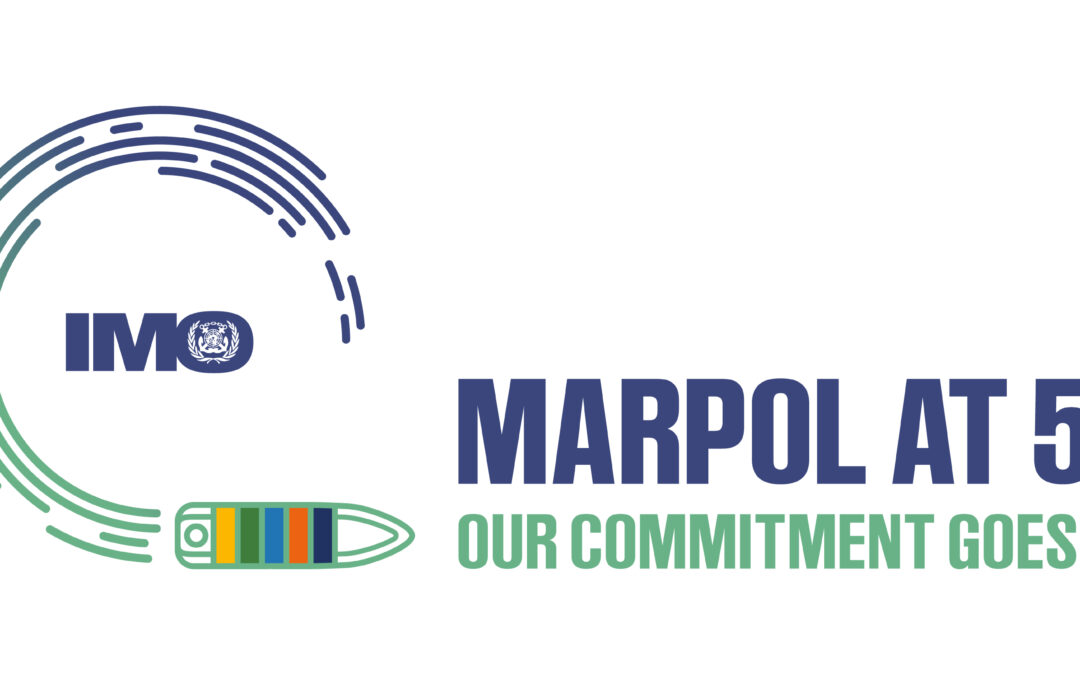
by Rabia Mathakutha | Sep 27, 2023 | Antarctica, Commemorative Days, Environment, International Days, SA Agulhas II, SA Polar Infratsructure, SA Polar Research Infrastructure, SANAP, SAPolarRI, SAPRI, Uncategorised
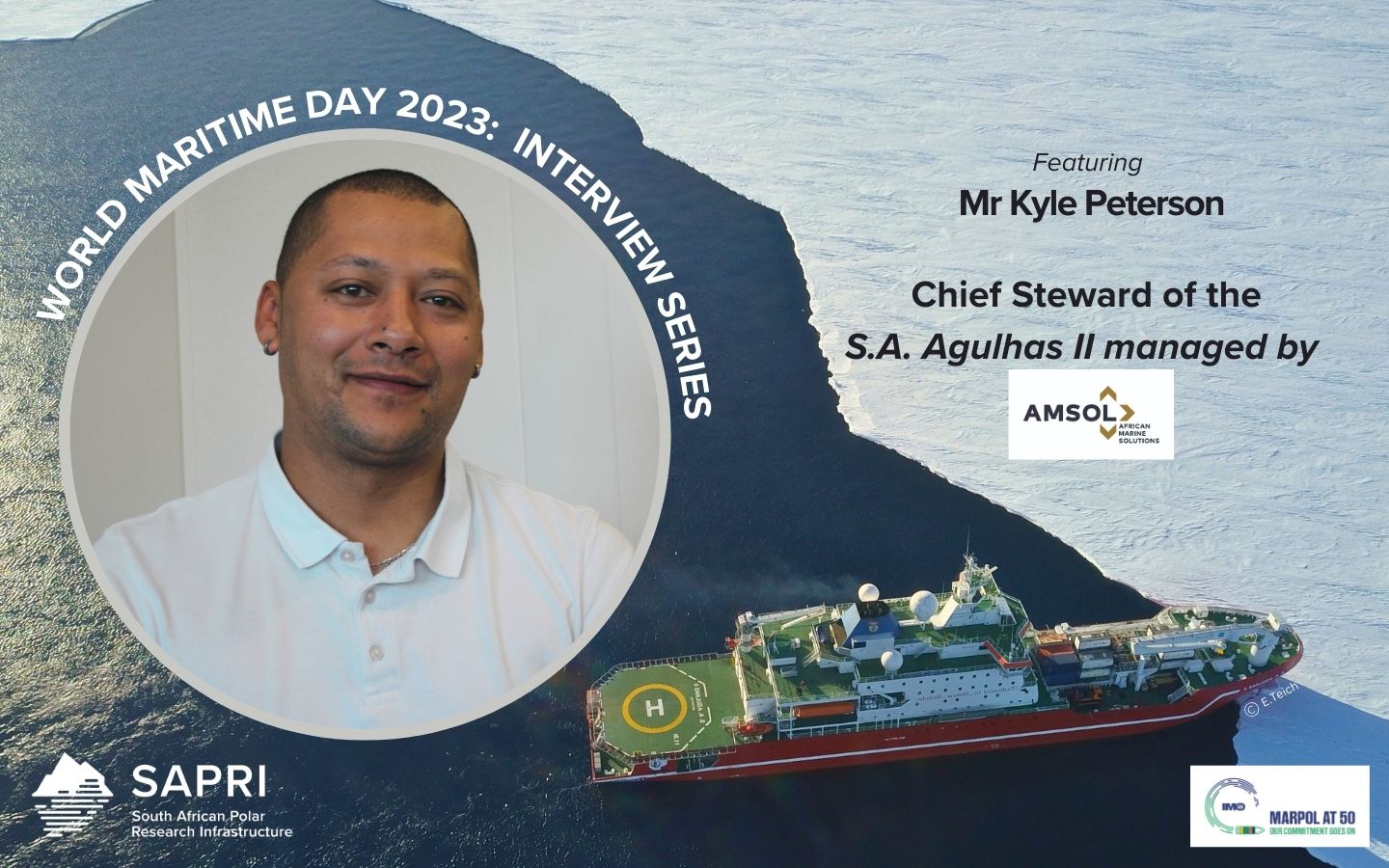
This is the last interview of The Maritime Interview Series, leading up to World Maritime Day, celebrated on 28 September 2023.
What was this series all about?
Every year on the last Thursday of September, nations around the world come together to celebrate World Maritime Day. This international observance aims to highlight the crucial role that shipping and seafaring play in our global economy and emphasise the importance of sustainable maritime practices.
Acknowledging the Role of South African Seafarers in the Maritime Industry
The maritime industry is the backbone of global trade. This industry connects countries, facilitates economic growth, enables scientific and research expeditions and plays a vital role in our everyday lives. However, the success of this enormous industry would not be possible without the men and women who sacrifice their time on land to serve our maritime needs. In recognising this, the South African National Antarctic Programme (SANAP) and the South African Polar Research Infrastructure (SAPRI), would like to honour some of our local seafarers working on board the South African research and supply vessel, the S.A. Agulhas II during various marine and Antarctic research related expeditions through the Southern, Indian and Atlantic Oceans.
The purpose of The Maritime Interview Series was to pay tribute to these seafarers, in anticipation of World Maritime Day.
The Maritime Interview Series Part 6 features Mr Kyle Peterson, Chief Steward of the S.A. Agulhas II.
What is your role on the ship?
“I am the Chief Steward on the S.A. Agulhas II”.His primary duties involve guaranteeing the welfare and satisfaction of both the crew and guests, while upholding stringent standards of cleanliness, hygiene, and safety aboard the vessel. Additionally, he oversees a team of stewards who play a crucial role in achieving these objectives. This entails managing provisions and inventory to ensure the well-being of the crew, supervising galley operations, maintaining cleanliness and housekeeping, overseeing laundry services, controlling inventory and expenses, delivering exceptional guest services, and ensuring preparedness for safety and emergency situations.
Mr Peterson’s Background and Journey into a Seafarer Career
When not at sea, Mr. Peterson resides in Grassy Park, Cape Town, but he grew up in Mitchells Plain, also in Cape Town. With over 10 years of experience as a seafarer and a total of 12 to 13 years in the hospitality industry, Mr. Peterson has been serving as a Chief Steward on the S.A. Agulhas II for the past two years. Prior to this role, he worked as a catering assistant, utility steward, and steward on the same vessel. However, his seafaring experience extends beyond the S.A. Agulhas II, as he has also worked on other vessels such as the tug vessel S.A. AMANDLA and NOMASA, the trawler ALGOA, the research and supply vessel S.A. Agulhas, and even an international French vessel.
Mr. Peterson shared insights into his early career journey before becoming a seafarer, mentioning his previous work at his mother’s clothing business, a fire station, and a printing shop, among other experiences. He emphasised the importance of seizing opportunities, stating that no job is too small because one never knows where it may lead. Mr. Peterson’s determination is evident in his pursuit of continuous learning and professional development. He is a SAMSA (South African Maritime Safety Authority) accredited officer and actively takes short courses to enhance his skills and potentially advance to the next level within the maritime industry.
What do you like the most about your job?
“I enjoy seeing new places, working with people, helping people (passengers and colleagues), and feeding passengers aboard the S.A. Agulhas II delicious and nutritious food”.
What are some of the challenges that you experience in your line of work?
Mr. Peterson shared some of the difficulties he faces, including being separated from his loved ones. Despite his extensive experience at sea, he mentioned that he occasionally feels the impact of turbulence during sailing, although he assured us that he does not suffer from seasickness.
Any advice to someone who would like to pursue this career?
“The importance of maintaining integrity in your work cannot be overstated, as your actions and dedication will ultimately reflect your character”. Lastly, “work hard, hard work pays off”.
(more…)
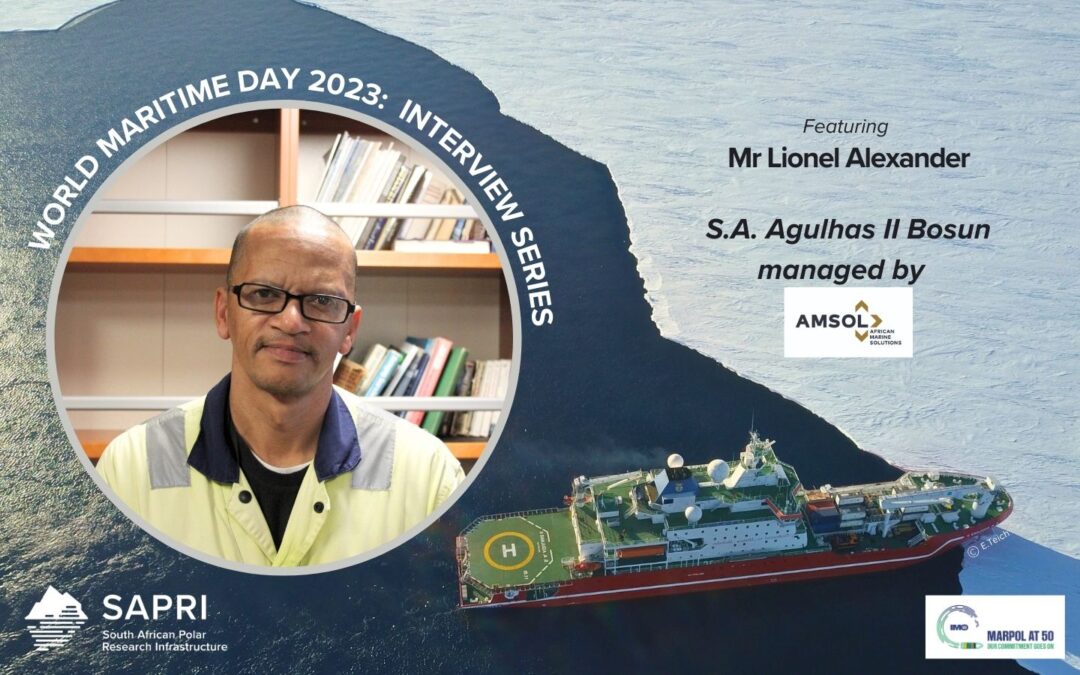
by Rabia Mathakutha | Sep 26, 2023 | Antarctica, Commemorative Days, Environment, International Days, News, SA Agulhas II, SA Polar Infratsructure, SA Polar Research Infrastructure, SANAP, SAPolarRI, SAPRI, Uncategorised
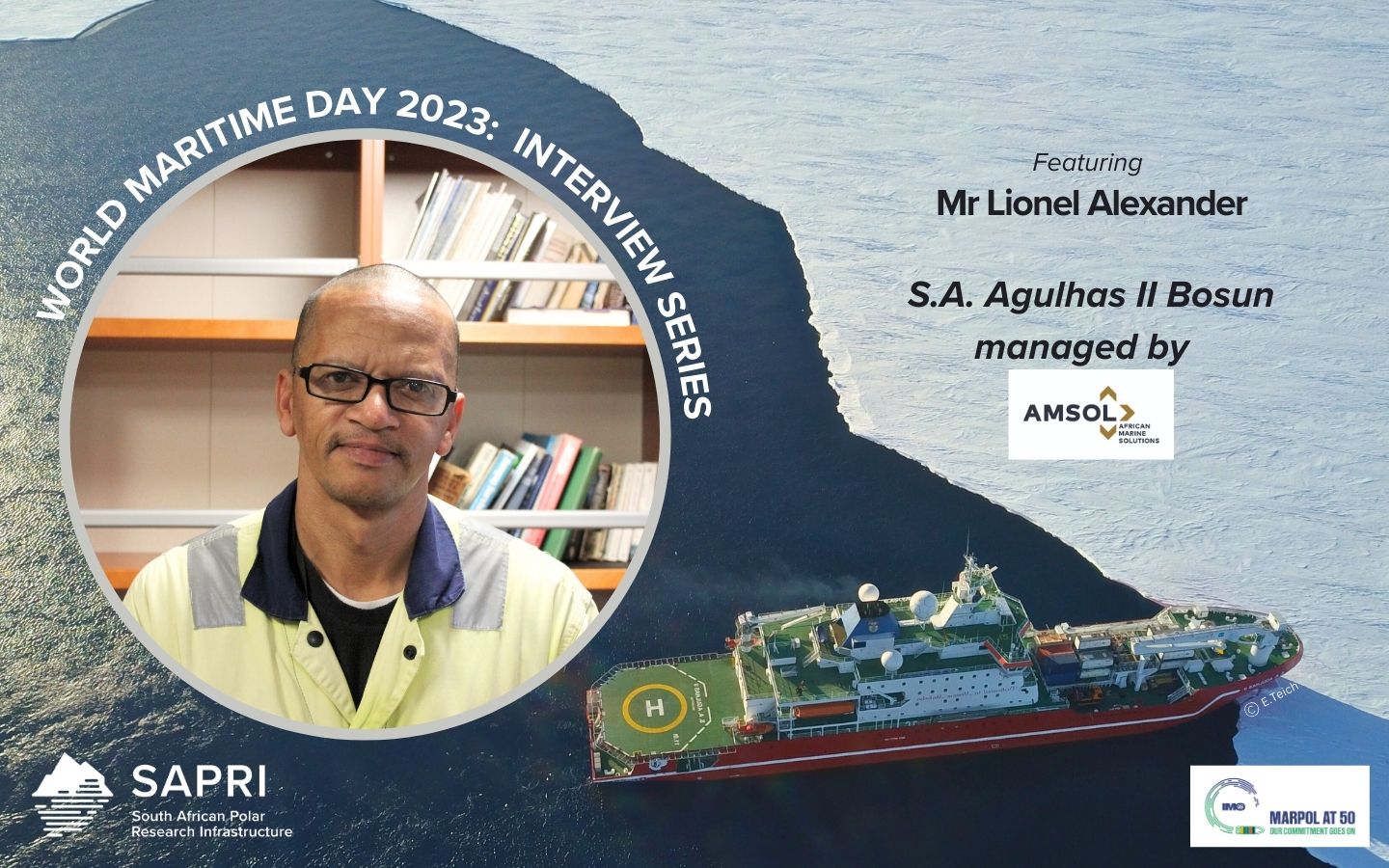
The Maritime Interview Series Part 5 features Mr Lionel Alexander, Bosun (or Deck Supervisor) of the S.A. Agulhas II.
Need to catch up? Click here for Part 1 to 4
Rabia Mathakutha (SAPRI DPS Research Coordinator) interviewed Mr Alexander during the SEAmester VI expedition.
What is your role on the ship?
“I am the Bosun, also known as a Boatswain, on the S.A. Agulhas II”.
Mr Alexander plays a vital role on the vessel and is responsible for various tasks related to deck operations and maintenance. His responsibilities as a Bosun on the vessel include supervising deck crew activities during research expeditions, deployment of science/oceanographic equipment, mooring anchoring, and cargo handling, ensuring the cleanliness and maintenance of the vessel’s deck and equipment, conducting safety inspections, participating in emergency drills, training and guiding deck crew members, and maintaining accurate records.
A boatswain or bosun, also known as a deck boss, or a qualified member of the deck department, is the most senior rate of the deck department.
The Bosun’s role is crucial in maintaining the efficiency, safety, and proper functioning of the vessel’s deck operations.
Mr Alexander’s Background and Journey into a Seafarer Career
Mr Alexander is a third generation seafarer with 28 years’ experience in the maritime industry. His experience on research and supply vessels such as the S.A. Agulhas and the S.A. Agulhas II, spans over 20 years. Mr Alexander says he spends 80% of his time in a year aboard and he loves it.
Through his experience as a seafarer, he has travelled to various places, including but not limited to, East Asia, Europe (including England, London, Monaco, Spain), Morocco, Mauritius, Chile, King Edward, and the sub-Antarctic islands and Antarctica. Mr Alexander has also travelled to the remote and isolated Weddell Sea off Antarctica aboard the S.A. Agulhas II, as part of the search of Sir Ernest Shackleton’s lost ship, The Endurance. For someone with such a wealth of knowledge and experience, Mr Alexander stroke us as a genuinely humble man, who is adored and respected by his colleagues.
We admire your level of experience, what are some of the life lessons that you have picked up along the way?
‘Having the right attitude is incredibly valuable, not just experience”.
He mentioned how important it is to learn to interact with people, to respect your colleagues and be a team player, not just in his line of work, but work in general. Mr Alexander talked about how being a Bosun and dealing with people comes with a lot of responsibility, and how he’s developed tactics to deal with different kinds of people. Not dropping the high standards he’s set for seamanship, is his biggest priority. Mr Alexander surprised us with his experience beyond working as a seafarer as he showed us carpentry items that he makes himself while at sea and on land, together with demonstrating his knowledge of oceanographic sampling. He says that he always tells people, “Don’t steal with your hands, steal with your eyes and learn”. It was fascinating to learn how much of a curious and faster learner Mr Alexander is.
What do you enjoy the most about your job?
Mr Alexander expressed his love for travelling and savouring the moments that come with long voyages to remote places. He told fascinating stories about how once with his crew aboard the S.A. Agulhas II, sailed through a rainbow and how much it looked like they were sailing into a magical portal, and a story about an-almost deadly encounter with a whale during one of their voyages to Antarctica. He said it’s moments like these when he just forgets to grab a camera, and he stops to take it all in; saying that every moment is beautiful, even amidst danger. He also said he enjoys working on the S.A. Agulhas II during research expeditions as he gets to learn from and help scientists, and in essence, accomplishing something as a team.
“Having a strong work ethic that is admired and respected by many, and being reliable to my responsibilities and my team is very important to me”, Mr Alexander continued as he added, “in order to lead, one must learn to follow”.
What are some of the challenges that you experience in your line of work?
Mr Alexander’s role as a Bosun requires him to deal with and supervise many crew members, as such, some of the challenges that he mentioned he experiences in his line of work are dealing with different characters of crew members who do not always follow the rules because not everyone is as dedicated. He said he counters this by learning the individual and treating them accordingly, while providing proper guidance and supervision.
Advice from the S.A. Agulhas II Bosun
When asked what advice he would give to someone who would like to pursue this career or a career in maritime, Mr Alexander joked and said “they must come see the Bosun first”, and then emphasised that one must have a passion for being at sea and to never stop learning.
World Maritime Day reminds us of the vital role that the maritime industry plays in our interconnected world. The maritime industry is also particularly crucial in enabling the science and research in the Antarctic region and Southern Ocean through SANAP.
Photo Credit: Rabia Mathakutha (South African Polar Research Infrastructure) and Eduan Teich via the Antarctic Legacy of South Africa (ALSA) Archive.
Written by: Rabia Mathakutha, South African Polar Research Infrastructure, 26 September 2023

 In the SANAP community we are celebrating all those involved as Researchers, Scientists, and Students at tertiary and research institutions and infrastructures, and personnel within the National Research Foundation, the Department of Forestry, Fisheries and the Environment, the Department of Public works and Infrastructure, the South African Weather Services, the South African National Space Agency, the South African Polar Research Infrastructure and all the women serving as part of the crew of the S.A. Agulhas II.
In the SANAP community we are celebrating all those involved as Researchers, Scientists, and Students at tertiary and research institutions and infrastructures, and personnel within the National Research Foundation, the Department of Forestry, Fisheries and the Environment, the Department of Public works and Infrastructure, the South African Weather Services, the South African National Space Agency, the South African Polar Research Infrastructure and all the women serving as part of the crew of the S.A. Agulhas II. Celebrating our women overwintering team members at our stations: Antarctica (SANAEIV), Marion Island and Gough Island.
Celebrating our women overwintering team members at our stations: Antarctica (SANAEIV), Marion Island and Gough Island. 2024 women’s day commemoration is a reminder of the important contributions that are made by women to society, as well as a time to reflect on the advances in women’s rights. During 30 years of democracy, South Africa has made significant strides in advancing gender equality in all domains of society, including economic empowerment of women.
2024 women’s day commemoration is a reminder of the important contributions that are made by women to society, as well as a time to reflect on the advances in women’s rights. During 30 years of democracy, South Africa has made significant strides in advancing gender equality in all domains of society, including economic empowerment of women. Women’s Day 2024 is the first national day led by the Government of National Unity (GNU) and takes place in a rural community as part of including all South Africans in national events, and placing a focus on the achievements and needs of women in all corners of the country. President Cyril Ramaphosa is expected to officiate the national Women’s Day commemoration in Pofadder in the Namakwa District, Northern Cape. – SAnews.gov.za
Women’s Day 2024 is the first national day led by the Government of National Unity (GNU) and takes place in a rural community as part of including all South Africans in national events, and placing a focus on the achievements and needs of women in all corners of the country. President Cyril Ramaphosa is expected to officiate the national Women’s Day commemoration in Pofadder in the Namakwa District, Northern Cape. – SAnews.gov.za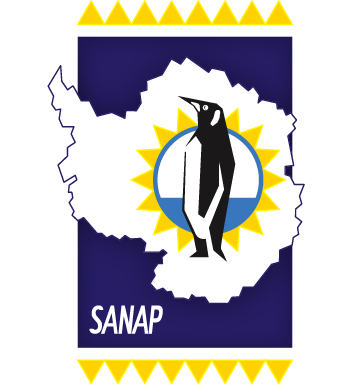

 The Open Day was hosted by the Department of Forestry, Fisheries and the Environment of the S.A. Agulhas II at the Port of Port Elizabeth on 16 May and on the 17 May 2024, 1000 learners from 40 schools around the Metro were hosted.
The Open Day was hosted by the Department of Forestry, Fisheries and the Environment of the S.A. Agulhas II at the Port of Port Elizabeth on 16 May and on the 17 May 2024, 1000 learners from 40 schools around the Metro were hosted. In addition to exploring the SA Agulhas II, visitors on both days were able to engage with a diverse range of exhibits and interactive displays at an expo organised by DEFF and its partners. The expo showcased the vital work being done in marine research, conservation, and environmental stewardship.
In addition to exploring the SA Agulhas II, visitors on both days were able to engage with a diverse range of exhibits and interactive displays at an expo organised by DEFF and its partners. The expo showcased the vital work being done in marine research, conservation, and environmental stewardship. “We are thrilled with the overwhelming response by the residents of Gqeberha to the SA Agulhas II Open Day in Gqeberha,” said Minister Barbara Creecy. “This event provided a fantastic platform for the public to learn about the important research conducted aboard the SA Agulhas II and the critical role it plays as a supply vessel to the three research bases in Antarctica, Marion and Gough Islands in the Southern Ocean.” Full media release
“We are thrilled with the overwhelming response by the residents of Gqeberha to the SA Agulhas II Open Day in Gqeberha,” said Minister Barbara Creecy. “This event provided a fantastic platform for the public to learn about the important research conducted aboard the SA Agulhas II and the critical role it plays as a supply vessel to the three research bases in Antarctica, Marion and Gough Islands in the Southern Ocean.” Full media release 
 The theme for World Environment Day and National Environment Month rests on three pillars. According to the United Nations Food and Agriculture Organisation (FAO), every year 1.3 billion tons of food is wasted. Therefore, communities are encouraged to “Think” before discarding food off as waste. The second pillar, “Eat” encourages consuming food in such a way that the environmental impact is reduced. Third pillar encourages communities to make wise decisions about discarding food and “Save” as far as possible.
The theme for World Environment Day and National Environment Month rests on three pillars. According to the United Nations Food and Agriculture Organisation (FAO), every year 1.3 billion tons of food is wasted. Therefore, communities are encouraged to “Think” before discarding food off as waste. The second pillar, “Eat” encourages consuming food in such a way that the environmental impact is reduced. Third pillar encourages communities to make wise decisions about discarding food and “Save” as far as possible.







